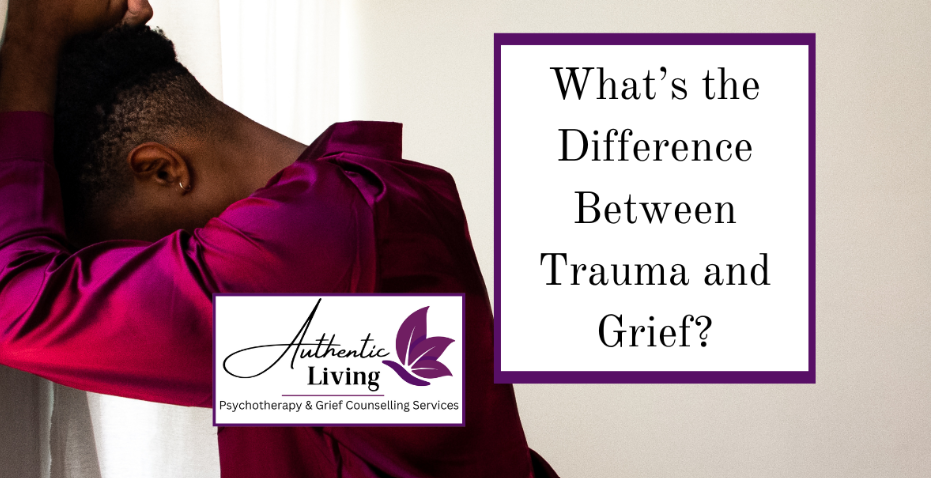What is the Difference Between Trauma and Grief: Understanding the Overlap and How to Cope
- Aug 10, 2025
- 5 min read
When life changes suddenly and painfully, it’s normal to feel overwhelmed. Sometimes that pain is called grief. Sometimes it’s called trauma. And sometimes, it’s both.
While grief and trauma often overlap, they are not the same. Understanding the difference can help you make sense of your feelings and choose the right kind of support.
At Authentic Living London, we see both grief and trauma as deeply human experiences that deserve care, compassion, and patience. Here’s how they differ — and what you can do when you’re living with one or both.

Grief: The Pain of Loss
Grief is the emotional, physical, and mental response we have to losing someone or something deeply important to us. While many people think of grief as only related to death, it can come from many kinds of losses — the end of a relationship, losing a job you loved, the decline of your health, or even a change in your life that shifts your identity.
Grief is the mind and heart’s way of adjusting to a world that no longer includes what we’ve lost. It often comes in waves — sometimes heavy and overwhelming, other times lighter but still present. You might cry easily, feel angry or irritable, have trouble concentrating, or notice changes in sleep and appetite.
It’s important to remember that grief is not something you “get over.” Instead, it’s something you learn to live with. The love or connection you felt doesn’t go away, and neither does the meaning of what you lost. Over time, the pain may soften, and the loss becomes part of your life story rather than the center of it.
Trauma: The Impact of Overwhelm
Trauma happens when an experience overwhelms your ability to cope in the moment and leaves a lasting imprint on your mind and body. It’s not just about the event itself — two people can experience the same event, but one may feel traumatized while the other doesn’t. What matters most is how your nervous system processes the event and whether it feels safe again afterward.
Trauma can be caused by one overwhelming event (like a serious accident, assault, or natural disaster) or by repeated exposure to distressing situations (such as ongoing abuse or chronic illness). It can also occur when something happens too quickly for you to emotionally process — like a sudden death or a shocking diagnosis.
The effects of trauma often go beyond emotions. You might feel constantly on edge, have flashbacks or nightmares, feel disconnected from your surroundings, or find your body reacting as if the danger is still happening — even when you know you’re safe. This is because trauma isn’t just “in your head.” It’s stored in the nervous system, and healing often means working with both the mind and body.
Where Grief and Trauma Overlap
Sometimes grief and trauma arrive together, creating a heavier emotional load than either would on their own. This often happens when a loss is sudden, violent, or deeply shocking — leaving you not only heartbroken but also shaken to your core.
For example:
Losing a loved one in a car accident or sudden medical emergency
Witnessing a death or life-threatening event
Experiencing a miscarriage after a frightening health crisis
Being present for a loved one’s final moments in an overwhelming or distressing setting
In these situations, the loss triggers grief — the sadness, longing, and yearning for the person or thing you’ve lost — while the traumatic elements can trigger symptoms like anxiety, hypervigilance, flashbacks, or a sense of numbness.
The overlap can make healing more complex. You might feel waves of grief but find them interrupted by distressing images or sensations from the trauma. You might want to remember your loved one with warmth, but the way they died keeps replaying in your mind.
This is why people experiencing both grief and trauma often feel “stuck” — because your mind is trying to process two different but connected emotional experiences at the same time. In these cases, healing usually means addressing both: finding ways to safely process the traumatic memories while also allowing yourself to mourn and remember.
Coping with Grief | Coping with Trauma | Coping When You Have Both |
| Focus on safety — remind yourself often that the danger has passed. Use grounding exercises like naming five things you see in the room.
|
|
Getting SupportYou don’t have to navigate grief or trauma alone. At Authentic Living London, we specialize in helping people process both — in ways that honour your story and move at your pace. Whether in person in London, Ontario, or virtually across the province, our therapists offer a safe space to talk, feel, and heal. If you’re ready for compassionate support, we’re here to walk beside you. |










Comments